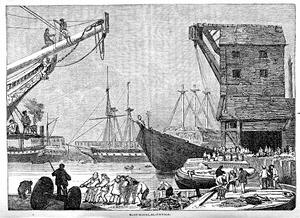Our rambles have now brought us to the Docks; but, before describing them, we must glance backward at the scenes which in former years met the eye on the very spots which these vast basins now occupy, for we shall include them all in this chapter.
There are people still living who can remember when Blackwall Reach had for its landmarks grim gibbet-posts, on which the bodies of pirates bleached and blackened in the storm and sunshine, 'making night hideous ;' when the whole neighbourhood beyond the Tower, instead of being the home of mighty ships - that seem to sleep after their perilous voyages in the Docks - was a nest of ill-famed streets and dangerous alleys, unsafe even in the open noon of day, and at night trodden with dread by the peaceful passenger; when the Tower Hamlets disgorged their lawless inhabitants to witness an execution on Tower-hill, attack a press-gang, or rescue some sailor from the claws of justice, to be borne in triumph to the nearest tavern., and. amid flip, fiddling, and dancing, bid defiance to every 'Charley' that for a mile around drawled out the passing hours. In. those days it was not uncommon for the drum to beat an alarm, and a troop or two of soldiers to turn out of the Tower, to quell the brawls which arose between the land-lubbers and the sons of the salt sea; nor were the military always successful in putting down these midnight riots; for whether Jack hunted a Jew or unroofed a crimping house, he would not give in (unless overpowered) until he had chased down the one and demolished, the other.
Ned. Ward, in his London Spy, describes the sailors he met with in his day in this neighbourhood, and says, 'Sometimes we met in the street with a boat's crew just come on shore, in search of those land debaucheries which the sea denies them; looking like such wild, staring, gamesome, uncouth animals, that a litter of squab rhinoceroses drest up in human apparel could not have made a more ungainly appearance. Every post they came near was in danger of having its head broken; for every one as he passed by gave the senseless block a bang with his cudgel, as if they wished every post they met to be either the boatswain or the purser. The very dogs in the street shunned them with as much fear as a loitering vagrant would a gang of press-masters, being so cautioned against their ill usage by the stripes they had formerly received, that, as soon as ever they saw a seaman, away ran the poor curs, with their tails between their legs, to avoid the danger of the approaching evil. I could not forbear reflecting on the 'prudence' (?) of those persons who send their unlucky children to sea to tame and reform them.'
Even now, after all the alterations and improvements which have been made, there are places in the neighbourhood of St. Katherine and the London Docks which present almost the same features as they did a century or two ago, and such may be found within five minutes' walk of the Docks we are describing. No contrast can be greater than that between the west and the east end of London; the very houses, dresses, and language of the inhabitants are different; for in the latter their talk is 'all of ships.' Here, at the shop-doors dangle oil-case nor'-westers, with long fantails behind, telling that, unlike the hats in Bond-street, these are made to keep a billow that breaks over the head out of the nape of the neck; while the rough pilot-coats that hang like skins about the tent of a Russian bear-hunter, proclaim that they were never made to be worn in 'a lady's chamber,' but to be donned where the winds whistle, and the sea-gulls scream, and the big waves come roaring after each other like a thousand unchained hungry lions. There you see the gaudy handkerchief which Jack loves to leave a little out, that it may be seen from his blue jacket-pocket; those slops, in the whiteness of which he prides himself; and the checked shirt that he delights to throw open about his sun-browned throat, while he leaves the fringed corners of his black neckerchief to flutter like a pennon in the breeze. There is a forecastle-smell about the streets, a minglement of junk and rum, tar and biscuit, casks, ropes, and tobacco, not unpleasant to one who is proud of the wave - washed island on which he was born.
But the grandeur of this locality is its magnificent Docks - watery squares surrounded with high-piled warehouses, and filled with gigantic shipping, the tall masts of which tower proudly above the loftiest houses. Here you see keels that have ploughed up the stormy Atlantic - sails hanging idly in the breeze that have been filled with the spicy gales of India - figures ahead that have looked down into icy seas, or bent listlessly where the waves of the warm Mediterranean roll, and the arch-backed dolphins tumble. It makes the heart of a true-born Englishman, although he is not worth a groat, beat high when he enters the gates that open upon such a scene of naval grandeur; and we forgive those old sea-kings, while we gaze around, who all but conquered our country, and blended their Danish with our Saxon blood. Warriors of old, who guided their snorting seahorses along the road of the swans, and swept the stormy Baltic to stand face to face with Alfred the Great, and to be at last scattered like the ocean spray by the arm of the Island King. Peace to their manes! they were the first who taught our grey forefathers that England's wooden walls are its safest bulwarks.
Many a house had to be levelled with the earth, and many an old graveyard to be dug up, before these mighty Docks could be made; even the ancient hospital founded by Queen Matilda seven centuries ago was demolished; and where oft the Sabbath-bell had tolled, and the old Londoners paused to glance at the 'narrow beds' where their fathers slept, or wore the stones hollow with their passing feet - all were doomed to be swept away, to make room for the 'guardian giants that prowl around our coasts.' From this, good came; living London had not room enough for her dead, and the green hills that look down upon her glory were then turned into sepulchres; rural cemeteries sprang up, and thither her departed sons and daughters were borne; instead of pent-up city churchyards, our metropolis became surrounded with great gardens of graves, which look like true resting-places. Over such, a poet might fancy their peaceful spirits would linger, and look beyond to where the vast city gradually grows in length and breadth from year to year, until, as is not improbable, it may at last extend its foot to the edge of the open ocean.
St. Katherine's, and the two adjoining London Docks - which alone cover a space of more than
a hundred acres - will contain six hundred ships, and near half a million tons of goods. In
the West India Docks, which lie nearer Blackwall, merchandise valued at twenty millions of money
has at one time been deposited on the wharfs, in the warehouses, and in the vaults below. The
wealth of London lies not in her gaudy shops: beyond the Tower stand her great storehouses.
A stranger who passes on the river on his way to Greenwich or Gravesend sees but little of these
enormous treasuries – the tops of the tall masts alone point out their 'whereabouts.'
These Docks are surrounded by high strong-built walls, so lofty, that it would be a puzzle to
a most expert thief to scale them, on account of the finish of the coping; and if even
this were accomplished, a greater difficulty would remain in getting over the bulky goods which
are stored within. The walls which encircle the two London Docks were erected at a cost of sixty-five
thousand pounds; and no less a sum than four millions was expended in completing this vast establishment.
 The
East India Docks are at Blackwall, and our engraving is a view of the old Mast-House in the
Export-Dock - one of the most prominent objects in the landscape, when the eye is turned in
that direction, either from the summit of One-tree-hill in Greenwich Park, or as seen from the
right of the Observatory.
The
East India Docks are at Blackwall, and our engraving is a view of the old Mast-House in the
Export-Dock - one of the most prominent objects in the landscape, when the eye is turned in
that direction, either from the summit of One-tree-hill in Greenwich Park, or as seen from the
right of the Observatory.
It will be readily imagined that such improvements as these were not made without meeting with much opposition, for it is on record that the cargo of a large vessel often took up five or six weeks before it was delivered: for before the Docks were made, goods were put into lighters at Blackwall, and carried to the old-fashioned quays near London Bridge, and. after a long delay, occasioned even by the Custom House authorities themselves, they were finally removed to the different warehouses in the City. In these good old times river robbery was a thriving trade; and we have more than rumour for asserting that many a fortune was made by this systematic plunder. No marvel that when the first inroad was made on these old vested rights, a clamour was raised by carmen, porters, lightermen, and all the shoal of waterside labourers, who benefited more or less by the very difficulties which attended the removal of merchandise, and that from Wapping to Westminster the whole aquatic populace raised their voices against the dock crusades. Even the Trinity House itself murmured about an. invasion of interests, and contended that the Royal Dock at Deptford would be ruined. City limits and city privileges were all in all to these sticklers for old rights; nor have matters altered much even up to the present day, when a proposed improvement in the sewerage of the City seems to create as much alarm as if all its charters and privileges were about to be undermined and swallowed up. All these claims and demands had to be bought up, and thousands were expended in silencing their clamours before the Docks were commenced; for there were legal quays beside the river, and moorages within, and landing-places, that time out of mind had their little perquisites. And when all the Joneses, Smiths, and Tomkinses were satisfied, the mighty work began to proceed; and thus in time spread out and rose up these broad city basins and high-piled warehouses, which are the pride of England and the envy of so many surrounding nations.
